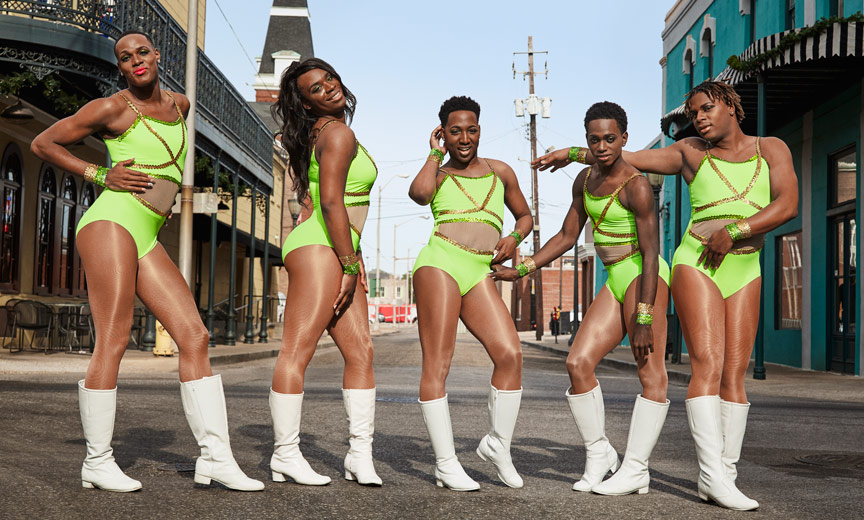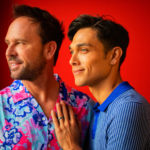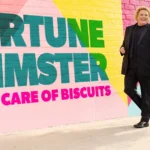From Mobile, AL, the Prancing Elites are a troupe of five J-Setters. Don’t know what J-Setting is? Think Beyoncé’s “Single Ladies” as performed by cheerleaders at a Vogue ball. Or better yet, find out from the Elites themselves.
Oxygen presents The Prancing Elites Project, a fun, funny and emotional docu-series, beginning Wednesday, April 22 at 10pm.
Matt Gurry spoke with each of the five in advance of the show’s premiere — Adrian Clemons, Kentrell Collins, Kareem Davis, Jerel Maddox and Timothy Smith — to get to know them both as individuals and as a troupe. Black, gay and non-gender-conforming, the Prancing Elites shake things up in the Deep South as they shake to their own beat.
So now, meet the Elites…
Tim
Tim Smith calls herself the shy one, but in talking to her, she seems anything but. She spoke with Metrosource about calling herself shy, calling herself “her,” and just calling herself Tim.
Were you born and raised in Mobile?
Yes I was!
How long have you been an Elite?
Since 2011.
How were you feeling the first time you put on the Green Apple [the name of the Prancing Elites’ uniform] and danced in front of an audience?
I was scared out of my mind! I was freaking out because I’m always nervous when it comes to performing. But once I start moving and I look over and some of my teammates are smiling at me, then I’m OK.
What are the crowds like in different places?
They’re different from Mobile people. They appreciate us. You know how when you’re walking and a person sees a gay person, and they’re like, “What the hell is that?” or, “What the hell does she or he have on?” They don’t do that in other places we go. They accept us more. But in our own hometown, they don’t support us.
To get the words right, you don’t prefer the word transgender; is that right?
No, I don’t like that. There’s nothing wrong with it, it’s just transgender is not me. It’s just “Tim.” That’s all I am. I’m not transgender, it’s just me being me! I like dressing up like a woman and looking pretty.
Is there a community in Mobile who have similar experiences as yours?
I can’t speak for other transgender women that are in Mobile. I don’t really go out with a lot of gay people. You know, I’m more of an at-home type. I go out to straight clubs, and I don’t ever get anything bad. I can’t speak for them; I can only speak for me.
If you’re more of an at-home girl, what do you do with your time?
Well I have a new nephew.
How old is he?
One month! He lives about 10 minutes away from me.
Do you feel any pressure to be a role model to him?
I don’t really feel pressure. My family looks at me like a girl, and I don’t really have to worry about certain things. So I don’t think it’s going to be any problem for him. My family, they’re not judgmental, and I’m quite sure they’re not going to teach him to be judgmental.
Are you excited about the show?
I’m so excited, but I’m nervous. Are we going to have to hide every time every time we come out of the door?
As I let you go, is there anything you want the country to know about you or the Prancing Elites or J-Setting?
Yes. I like ponies!
Read Next | 19 Best Rooftop Bars in NYC You Need to Visit
Jerel
Jerel Maddox became a Prancing Elite with Kareem in 2012. He’d been dancing before, but had been a fan of Kentrell and his troupe, and saw an opportunity to unite and represent Mobile.
When did you become a Prancing Elite?
I joined December 16, 2012.
That’s so specific. Why do you remember it was December 16?
It was a big move for me. Prior to joining the Prancing Elites I had my own dance team, and I’d always seen kentrell and his team around, and many other teams, too. We’d always talked about joining the teams together to represent Mobile together instead of as, like, five different teams.
But I remember the tryouts really well. It was a moment that I said I want to do myself that this is something I wanted to do, and I wanted to represent Mobile. I wanted to show people that if Mobile sticks together, we can make something happen.
There are other teams like the Prancing Elites out there?
Oh yeah! There are, like, hundreds of teams!
Are there others in Mobile?
Yeah, like three or four.
And are you all friendly?
Yeah. I mean, with gays you do have your shade that comes along with it. But for the most part, yeah.
In the first episode, we see you all go to a parade, and you get some nasty reactions. So I’m wondering why you guys don’t pack up and go to another city where people would be more likely not to be so…mean.
We’re risk-takers, and we don’t care. Just because there are those people who don’t like us, it’s not the whole city. In this city we live in, somebody likes us. Just because you may not like what we do, your child may like it or your grandmother may like it.
Also in the episode, we see a woman with her daughter come up to you and tell you she’s proud of you guys for doing what you do. Are those moments common for you guys?
Yeah, it is. And, see, that’s the reason we don’t pack up and leave. We know that someone’s out there who gets the message we’re trying to do. A lot of people think we’re going city to city and trying to corrupt, but that’s not the case. We just want to be accepted like everyone else in the world. So that’s why we do what we do: People like the little kid, or their parents, they appreciate the message we’re trying to send out, and that’s what motivates us.
Does that happen a lot? People who think you’re out to “corrupt” but then see what you’re all about and come around?
We get that all the time, and that’s why we don’t stop. At first when you see us, your whole pretension is going to be about gender. They’ll think, Why are these guys in leotards? Why do they have on makeup? But once you see us dancing, they don’t care what we look like or who we are, they like our dancing.
I think when your show comes out, it will be a lot of people’s first time getting to know Mobile well. Is there anything you want us to know as we get to know your city?
Just don’t be afraid to be who you are. There’s talent everywhere, but I think there are a lot of people hold back their talent because the area they may live in. Just because your city or your state is stuck in the 1920s, it shouldn’t hold you from living your truth and being true to yourself.
Adrian
Adrian Clemons, along with Kentrell, is one of the original Prancing Elites (as they’re now called). Though trained in classical dance, he has chosen to choose the niche of J-Setting because it’s just “more Adrian.”
Hi, Adrian! How are you?
I’m wonderful!
I was surprised to learn you turned down Alvin Ailey Dance Theater. They’re a big deal! Why did you?
It was basically that my dance teacher wanted to take me to the audition. I had a meeting with her and we were about to go, but it just wasn’t something for me. The dancing I was doing in school was a technical style. Basically, my teacher found I was naturally good at it, but it was something I was doing for her more than for me.
Though I am talented in all forms of dancing, J-Setting is a style of dance I felt was more diverse and was more “Adrian.” I didn’t want to do something a typical male would do. I wanted to do something out of the ordinary. I wanted to do J-Setting.
Even though it’s not as defined of a road…
I want to do what I want to do, and I want to fight for what I believe in. In today’s society, J-Setting is not for males. I want to make that change. I want to make a difference. I didn’t want to do typical.
Why is J-Setting a woman’s world? Why is it atypical for men to do it?
My definition of J-Setting is basically cheerleading and voguing, and when you think of cheerleading, most of the time, you think of females. When you look at J-Setting there is a lot of movement with straight, sharp arms, which in society today is “feminine.” Females were the first to bring it out in the open, but J-Setting originally started from gay males. It originated in the LGBT African-American clubs.
Kentrell told me you two have been dancing since 2006?
Yeah, I met Kentrell in ‘04 and I started dancing with him in ‘06. That was the first time we ever put on a leotard in public.
What was that day like?
Ohhh myyy Goood! It was like we were the first set of males ever to do that since Creation. It was something that was very– I didn’t know what I was getting myself into, I didn’t know how the crowd was going to take it. My heart was racing. I was wondering who was going to see me. Were people going to be violent? Would they throw things? It was an indescribable feeling.
How did the crowd take it?
They reacted very well! After that game, we would travel every weekend and get bigger and bigger crowds. People would come to games specifically looking for us. I’m not going to lie, you had some that didn’t like it, people who would move away from us when we’d start dancing. But then there was only more room for the people who loved us!
Right now, today, when we go and dance, there will be one person who says, “I’ve been watching you all since 2006. I remember y’all. I’ve been watching you for a long time.” They know exactly who we are. It feels incredible, like I’m a role model of some sort, like an accomplishment. It makes me feel I can do whatever I want to do. Somebody’s going to like it regardless. Somebody is going to love me for who I am and what I do. And things like that, I can honestly say, are what push me to go on. I wake up every day thanking God that I can J-Set at the end of the day.
That’s a really nice thing to hear.
We’ve grown a thick skin. It’s like tunnel vision: When people say negative things we hear nothing, we see nothing; we only hear the positive, we only hear the cheering.
Kareem
Kareem Davis has been with the team since 2012. His background is in sports, and the contradiction of an athlete in a dance team is just one of many that Kareem embraces.
So you’re the newest member of the current Elites–
Well, Jerel and I came on at the same time. We were on a team together before the Prancing Elites. But I’m the newest to the style.
Oh, OK. So then how did you come to J-Setting?
I did hip-hop, and I had a lot of friends doing ballet and contemporary. When it came to dancing, I wanted to learn, as much as I could, any style I could and that style was the newest to me.
But you did come from an athletic background, right?
I played basketball, football, soccer, I ran track and cross country. I did a lot of that to keep busy because I don’t have the ability to sit still. I feel any free moment is a moment to be making something happen.
And in between all those things, I made my way into theater. My first interest in performance was acting. I would have stuck with it, but most drama teachers are a little nutty, and I’m enough crazy for two or three people. I couldn’t handle another crazy person! She was very adamant about me being involved, but I was just– It was too much crazy!
Did you perform when you were working with her?
Yeah, I did a play. And she knew I had a dance background, so she wanted me to do a musical. I didn’t want to venture that far into it at the time, though. Had I known what I know now, I probably would have gone along with it because now all I talk about is theater.
Do you live in Mobile now?
Yes I do.
How are you liking it?
I like it, but I’m a country boy so this is…different. I like the convenience of where I live now, but at the same time I liked that when I lived in my hometown, no one knew where I lived unless I invited them over. I want to hold on to that privacy. I feel like so much of life is about to be opened up. So I don’t know if I will stay in the city or get out to the suburban parts.
Being a private person, how do you feel about having your life opened up on a national show?
I remember sitting down with our showrunner, and she asked me if I should go on national TV if I have these personal things going on. Then I thought maybe this is the way I’m supposed to deal with them. Thus far it’s been fairly easy, but when the process started I had anxiety. After a year, though, I thought this could be a way to deal with a lot of problems I had never addressed.
Are we going to see you dealing with these things on the show?
Yes. On the show, you’ll see me dealing with the more present issues. I think in the long run I think I’ll open up more personally.
It’s funny to hear you say that: You’re an athlete, which is a kind of performer; you’ve done drama; and the Prancing Elites get so much attention. Are there two Kareems, then?
I wouldn’t say there are two. I’d say there are like five.
I’m the type of person you’re never going to figure out because when you think you have me figured out, everything changes. It’s hard for me to figure myself out, so it’s going to be difficult for anyone else to figure me out.
Kentrell
Kentrell Collins is the team’s leader, who in 2006 started the team as it’s known today. Here, he introduces us to the Prancing Elites and explains what it is the Prancing Elites do.
How did you become the Elite-in-chief?
The team has been around for forever and in 2004, the team was named J-Sets of Mobile. A lot of people who used to dance just fell off. In 2006, I took over after the person who brought me in – his name was Elite – I took over after he passed. People stopped dancing, so I decided to take over, and I named the team after him.
How do you find dancers?
Well, this is such a small town that we only have one gay club, and a lot of the dancers go there. So we go to the clubs and pass out flyers to the people who are already dancing. They might think it sounds interesting, so then they come along to the audition.
What are you looking for in a dancer?
I look for potential. It’s great that you can dance, but I’m looking for a person that has natural talent that I can groom.
And you can tell that after a couple minutes?
Actually, I can tell that from someone’s first move. I judge a lot of competitions and auditions, and I can tell when somebody has that oomph a team needs. I can just look at a person and how they stand and see if this is going to be a person that I need.
Maybe this is a good spot for you to explain J-Setting to me…
J-Setting is hip-hop, cheerleading and voguing, all in one. Everything is done on an increment of an 8-count. And in J-Setting there’s what we call “lead/follow,” so you have the person in the front throw a count and then everyone follows them.
What is throwing a count?
When you see a captain in the front and they start dancing. They do one 8-count, and then the team behind them does that same 8-count. We practice the 8-counts ahead of time, so when it’s being thrown, [the teammates behind] know what to do.
Where are you doing this?
We mainly dance at college football games. We stopped dancing at high school games a couple years ago because, of course, the police had something to say. The school board said that if we’re not part of the actual auxiliary team with the marching band then we’re not allowed to dance in the stands. They said, “If you dance in the stands, then the police will escort you out. So we decided to dance at college games only.
And when you’re dancing at college games, it’s as audience members?
That’s right.
Why do you think the police and the school board would have a problem with you dancing in the stands?
We’ve been to these high school games – and this is just my opinion – and we’ve seen girls get up and dance, and no one says anything, ever. However, we have witnessed that when the Prancing Elites get up and try to dance at a high school game, we’ve seen the police make us stop. I don’t think it’s when anyone is dancing, I think it’s just when the Prancing Elites are dancing that it’s an issue.
Last modified: August 12, 2019














